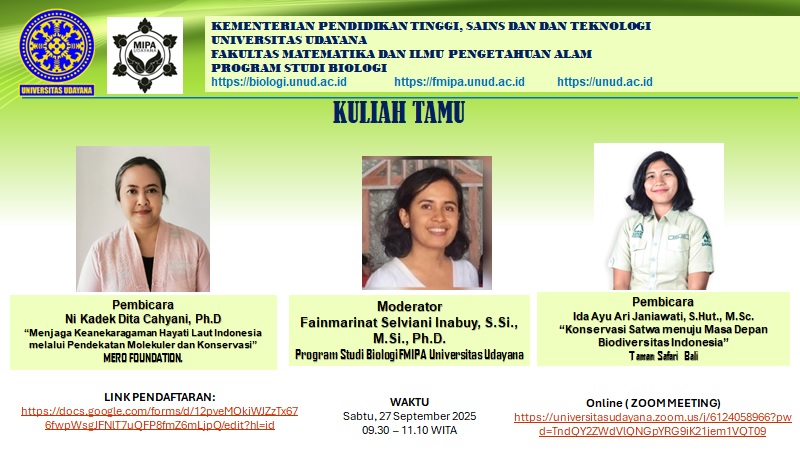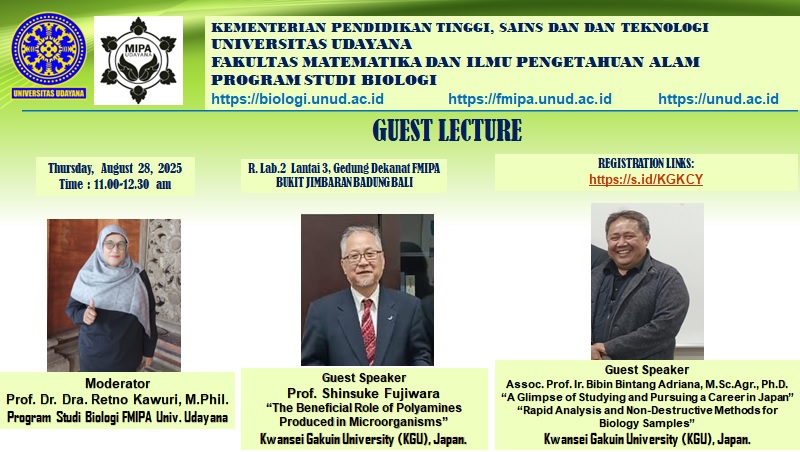Having a priority in managing biodiversity, PT Tirta Investama – Mambal Factory (AQUA) collaborates with the Biology Study Program FMIPA Udayana University in monitoring biodiversity in the target villages
Biodiversity
is one of the main considerations in regional development. The decline in
ecosystem function due to the decline in biodiversity not only causes local
losses, but has the potential to have a multiplier effect on regional
development in the future. Apart from that, the impact of decreasing
biodiversity has begun to have a significant impact in the last few decades,
such as the difficulty of encountering certain species and the decline in
ecosystem function.
PT
Tirta Investama – Mambal Factory (Aqua) has several assisted villages that not
only focus on social activities, but also on nature conservation. To optimize
nature conservation activities, PT Tirta Investama – Mambal Factory has
established cooperation in the form of a Memorandum of Understanding with
Udayana University which was followed by a Letter of Agreement with the Faculty
of Mathematics and Natural Sciences. This collaboration was implemented by the
Biology Study Program and the Biology Student Association (Himabio) FMIPA Unud
through the Bali Biodiversity Camp program.
Bali
Biodiversity Camp, better known as BBC, is an activity that has been carried
out regularly since 2021 to assist conservation cadres assisted by PT Tirta
Investama - Mambal Factory in monitoring biodiversity. BBC activities in 2024
consist of three main agendas, namely a flora and fauna data collection
workshop on 1-2 June 2024, biodiversity monitoring in the Desa Adat Karang
Dalem Tua, Abiansemal District on 8-9 June 2024, and biodiversity monitoring in
Banjar Jempanang, Belok Sidan Village, Petang District on June 15-16 2024.
A
workshop on collecting flora and fauna data was held on the Biology Study
Program campus, FMIPA Unud with 32 participants, carried out over two days. On
the first day, the workshop event began with remarks from the chairman of
Himabio for the 2024 period, Nani Sifani br Wargain-angin, which was then
opened by the Coordinator of the Biology Study Program, Dr. I Ketut Ginantra,
S.Pd., M.Si. After the opening, the event continued with a presentation on
insect data collection by Dr. Ni Made Suartini, S.Si., M.Si which continued
with practice using a sweep net and preserving insects. Next, there was a
presentation on flora data collection by I Made Saka Wijaya, S.Sc., M.Sc.
accompanied by practice. Flora data collection includes land plant diversity
data and ecological data collection to study vegetation conditions in the
monitoring area. The event on the first day closed with an evaluation of the
data collection results, as well as noting errors or areas that needed to be
improved.
On
the second day, material was given by Dra. Luh Putu Eswaryanti Kusuma Yuni,
M.Sc., Ph.D. regarding how to collect bird data, followed by the practice of
filling out tally sheets and using binoculars. Activities carried out around
campus are able to provide workshop participants with insight into the
diversity of bird species around campus. It's like, students are studying
together with bird species who are listening to the lecture from the room
window.
The
next event was monitoring in the Desa Adat Karang Dalem Tua which is located in
Abisansemal District, Badung Regency. This activity was carried out for 2 days,
namely on June 8 and 9 2024. Flora and fauna data collection was carried out in
the morning and afternoon. On June 9 2024, before the activity ended, a presentation
was made by participants regarding the results of the monitoring that had been
carried out. Apart from that, the community was also involved in taking part in
this activity, thereby indirectly providing education about the importance of
protecting the environment in the Desa Adat Karang Dalem Tua. The introduction
of rare species and species that are increasingly difficult to find in
Indonesia (especially Bali) is also carried out to increase public awareness
that there is currently a biodiversity crisis in Indonesia. One of the
interesting things was the participant's encounter with the crested serpent
eagle (Spinornis cheela) which flew low in the morning, thus triggering
the participant's enthusiasm even higher.
One
week after the activities in Desa Adat Karang Dalem Tua, monitoring continued
in Banjar Jempanang located in Belok Sidan Village, Petang District, Badung
Regency. Activities in Banjar Jempanang were also carried out for two days,
namely on 15 and 16 June 2024. Observations on the first day gave a unique impression
for each group. Participants who were divided into three groups explored three
types of land, namely forests, plantations and around rivers. These different
locations turned out to have a diversity that was not completely the same, so
that participants were able to discuss the results of their observations. After
presenting the results and discussions on June 16 2024, the BBC 2024 event was
officially closed by the person in charge of activities from PT Tirta Investama
– Mambal Factory. After closing, the top predators in Banjar Jempanang also
said goodbye by passing the participants to the forest area in Banjar
Jempanang. The two predators are the crested serpent eagle (Spilornis cheela)
and the black eagle (Ictinaetus malaiensis)
In general, BBC 2024 activities have various impacts on society and students. From this activity, the community increasingly understands the high potential of biodiversity in the area, as well as the importance of maintaining the existence of biodiversity in supporting ecosystem functions. From a student's perspective, this activity teaches technical skills in collecting flora and fauna data. Apart from that, students can also hone their speaking skills when conveying monitoring results to the public.


.jpg)
FACULTY OF MATHEMATIC AND NATURAL SCIENCES